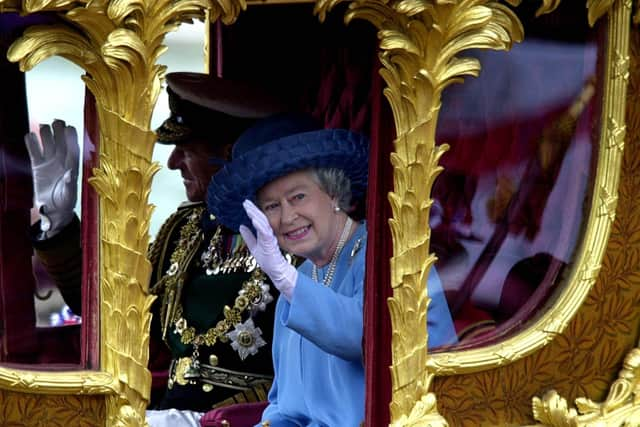The influence new King wields makes the traditions and values he represents far from obsolete - David Behrens
Very few could remember a spectacle like that of last weekend, when the new Sovereign was proclaimed from the steps of every Town Hall. The unfamiliar cries of God Save The King sounded at first almost Shakespearean to our modern ear.
But as the sadness fades at the loss of a monarch who by common consent did an extremely good job for an inordinately long time, we will adjust to this Royal rebranding. The banknotes, police helmets and postage stamps will change; the insignia CR will appear on red letter boxes, and the bewigged denizens of the Crown Courts will change the initials after their names to KC.
Advertisement
Hide AdAdvertisement
Hide AdAnd yet, life has gone on almost as normal these last few days. A visitor to these shores who chose to judge the national mood by the BBC schedules alone would have drawn quite the wrong conclusion. Even the many who took their places along the processional routes or who signed a book of condolence went about the rest of their business as usual.


I was among them. In Hull last Friday morning, I walked past the Minster and was beckoned inside by tour guides who had been redeployed to more appropriate duties. The condolences already extended to several pages so I doubt that anyone will read mine – but for what it’s worth, I wrote that Elizabeth II had been a part of all our lives, whether we knew it or not.
That more than anything, I think, explains the compulsion amongst even the most sceptical observers to watch and wonder at the week’s pageantry; to be a part of history rather than apart from it.
It is a sentiment that will manifest itself most at Monday’s state funeral. There has not been such a moment of national unity since 1965, when Churchill became one of the very few commoners to be accorded the honour, and I remember – just – the sense of togetherness that it instilled. Two rivers ran through London that day, wrote the journalist Vincent Mulchrone, and one of them was made of people.
Advertisement
Hide AdAdvertisement
Hide AdThe respect for Churchill was universal and tangible. Many of those lining the banks of the Thames had voted to unseat him in 1945, yet he was not a polarising figure. The electorate had judged him the wrong leader in time of peace but they acknowledged their debt to him in war. My dad would no sooner have voted Conservative than for Oswald Mosley, but he’d been in the RAF from 1944 and recognised, as did everyone he knew, that it was Churchill to whom they owed their deliverance. If not for him, those crowds in London in 1965 might have been wearing jackboots instead of Wellingtons. Dad kept a front page of one of that day’s papers until the day he died; I have it still.
Queen Elizabeth’s funeral – we can no longer just call her ‘The Queen’, for we have a new one now – will demonstrate how much of British life has remained the same since 1965, as well as how much has changed. Then, businesses closed for the day out of a sense of duty; today it’s seen simply as good public relations. Some have misjudged the public mood to their cost; Center Parcs took subservience a step too far when it tried to postpone people’s overpriced holidays with them.
The King’s judgement, on the other hand, has been largely above reproach, and he has begun his reign with more goodwill than he or we might have expected – both here and abroad.
America, which traditionally marvels at Britain’s pomp and ceremony as if it were a giant theme park, a United Magic Kingdom, seems to consider him already a statesman of unparalleled influence; his advocacy for environmental issues counting for more than his mother’s inscrutability ever did. CBS News, whose coverage has been more objective than the BBC’s but no less respectful, described him as “years ahead of the curve” on issues that politicians are only now beginning to address.
Advertisement
Hide AdAdvertisement
Hide AdCharles was not the only person to make himself heard before it was fashionable, but his voice was amplified, to a degree that others were not, by the weight of the decorations on his shoulders.
Lest we have already forgotten, we had a new Prime Minister last week, too – but her voice doesn’t command attention on the world stage. The influence that Charles alone wields makes the traditions and values he represents very far from obsolete.